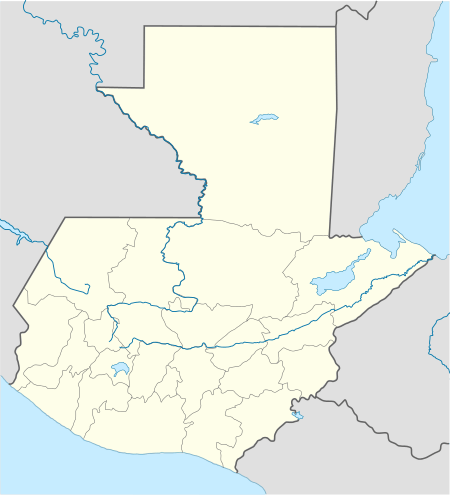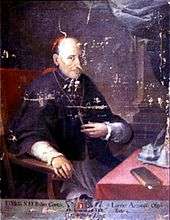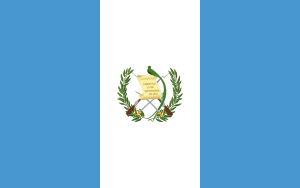Tacaná
Tacaná is a town and municipality in the Guatemalan department of San Marcos.
Tacaná | |
|---|---|
Municipality | |
 Tacaná Location in Guatemala | |
| Coordinates: 15°14′29″N 92°04′06″W | |
| Country | |
| Department | |
| Government | |
| • Mayor | Eugenio Hernández[1] (CREO) |
| Area | |
| • Municipality | 377 km2 (146 sq mi) |
| Population (2018 census)[2] | |
| • Municipality | 75,788 |
| • Density | 200/km2 (520/sq mi) |
| • Urban | 8,725 |
| Climate | Cwb |
History

In 1690, Tejutla had a large area and included the modern municipalities of Comitancillo, Ixchiguán, Concepción Tutuapa, Sipacapa, Sibinal, Tajumulco, Tacaná and part of what is now San Miguel Ixtahuacán. According to the historical writings from Recordación Florida of Francisco Antonio de Fuentes y Guzmán, Tejutla belonged to Quetzaltenango Department and it was a "prosperous land with rich weathers and comfortable forest with enough water".[3]
Tejutla was an important commercial and religious center; in August 1767, Joseph Domingo Hidalgo described Santiago Tejutla as "El Curato" -i.e., the focal center of commerce of all the towns that were around it− in the Gaceta de Guatemala, the official newspaper of the times. Then, in the last quarter of the 18th century, bishop Dr. Pedro Cortés y Larraz, who arrived from Cuilco in 1770 as part of the inspection he was doing of the Guatemalan dioceses, called Tejutla "Santiago en la Cima del Monte" (English: Santiago at the top of the hill" and reported that there were "sixty four families who lived very well" in the area.[4]
The Central American United Provinces constitution from 11 October 1821, showed Tejutla under modern San Marcos jurisdiction for the very first time.
In 1870 Tejutla reached "Villa" category and, due to its development, its authorities requested to the House of Representatives of Guatemala to be named a Department capital. The department was going to have the municipalities mentioned above, along with the modern municipalities of Cuilco, Santa Bárbara and San Gaspar, Huehuetenango, from the modern Huehuetenango Department. Besides, in those days, Motocintla, Cacahuatán and Tapachula—which would go definitively to México in 1892 due to the Herrera-Mariscal treaty[5][6]— were under the jurisdiction of the Mercedarian convent located in Tejutla. Furthermore, Tejutla even had House representatives of its own in those days.
But power shifted when the conservatives led by field marshall Vicente Cerna werfe defeated by the liberal forces of generals Miguel Garcia Granados and Justo Rufino Barrios −who was a San Lorenzo native; once the liberals were in power, the expelled the regular clergy from Guatemala and abolished mandatory tithing for the secular clergy, leaving Tejutla without their main administrative and leadership support, the curato. In fact, Barrios government confiscated monasteries, large extensions of farm land, sugar mills and Indian doctrines from regular orders and then distributed it to his liberal friend and comrades, who became large landowners in the area.[7]
Climate
Tacaná has temperate climate (Köppen: Cwb).
| Climate data for Tacaná | |||||||||||||
|---|---|---|---|---|---|---|---|---|---|---|---|---|---|
| Month | Jan | Feb | Mar | Apr | May | Jun | Jul | Aug | Sep | Oct | Nov | Dec | Year |
| Average high °C (°F) | 19.0 (66.2) |
19.4 (66.9) |
20.9 (69.6) |
21.3 (70.3) |
20.7 (69.3) |
19.9 (67.8) |
19.8 (67.6) |
20.2 (68.4) |
19.7 (67.5) |
19.2 (66.6) |
19.3 (66.7) |
19.3 (66.7) |
19.9 (67.8) |
| Daily mean °C (°F) | 11.5 (52.7) |
11.8 (53.2) |
13.2 (55.8) |
14.1 (57.4) |
14.7 (58.5) |
14.7 (58.5) |
14.6 (58.3) |
14.4 (57.9) |
14.5 (58.1) |
13.9 (57.0) |
12.9 (55.2) |
12.4 (54.3) |
13.6 (56.4) |
| Average low °C (°F) | 4.1 (39.4) |
4.2 (39.6) |
5.6 (42.1) |
7.0 (44.6) |
8.8 (47.8) |
9.6 (49.3) |
9.4 (48.9) |
8.7 (47.7) |
9.3 (48.7) |
8.6 (47.5) |
6.5 (43.7) |
5.5 (41.9) |
7.3 (45.1) |
| Average precipitation mm (inches) | 6 (0.2) |
6 (0.2) |
24 (0.9) |
66 (2.6) |
171 (6.7) |
268 (10.6) |
194 (7.6) |
219 (8.6) |
255 (10.0) |
173 (6.8) |
26 (1.0) |
12 (0.5) |
1,420 (55.7) |
| Source: Climate-Data.org[8] | |||||||||||||
See also


- La Aurora International Airport
- Tapachula International Airport
- Volcán Tacaná
Notes and references
References
- "San Marcos elige autoridades municipales". Prensa Libre (in Spanish). Guatemala. 8 September 2015. Retrieved 8 September 2015.CS1 maint: ref=harv (link)
- Citypopulation.de Population of departments and municipalities in Guatemala
- Fuentes y Guzmán 1932.
- Cortés y Larraz 1770.
- Comisión Guatemalteca de Límites con México (1900). Memoria sobre la cuestión de límites entre Guatemala y México (in Spanish). Guatemala: Tipografía Nacional. p. 325.CS1 maint: ref=harv (link)
- "Nuestras fronteras". La Ilustración Guatemalteca (in Spanish). Guatemala: Síguere, Guirola y Cía. I (13). 1896.CS1 maint: ref=harv (link)
- Castellanos Cambranes, Julio (1992). "5. Tendencias del desarrollo agrario en el siglo XIX y surgimiento de la propiedad capitalista de la tierra en Guatemala" (PDF). 500 años de lucha por la tierra. Estudios sobre propiedad rual y reforma agraria en Guatemala (in Spanish). Guatemala: FLACSO. 1.CS1 maint: ref=harv (link)
- "Climate: Tacaná". Climate-Data.org. Retrieved 5 September 2015.
- SEGEPLAN (n.d.). "Municipios del departamento de San Marcos". Secretaría General de Planificación (in Spanish). Archived from the original on 10 July 2015.CS1 maint: ref=harv (link)
Bibliography
- Cortés y Larraz, Pedro (1770). Descripción Geográfico-Moral de la Diócesis de Goathemala (in Spanish). Guatemala: Diócesis de Guatemala.CS1 maint: ref=harv (link)
- Fuentes y Guzmán, Francisco Antonio de (1932) [1690]. Recordación Florida. Discurso historial y demostración natural, material, militar y política del Reyno de Guatemala. Biblioteca Goathemala de la Sociedad de Geografía e Historia Volumen VI (in Spanish). I-III. Guatemala: Tipografía Nacional.CS1 maint: ref=harv (link)